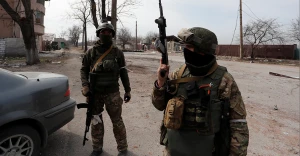
Heads of US and British intelligence tell how they try to prevent war in Ukraine
Before Russia's full-scale invasion of Ukraine, Washington and London took an unusual step by making public their information about Moscow's plans
The head of the British agency GCHQ (Government Communications Headquarters) Sir Jeremy Fleming spoke about this with the US intelligence head Avril Haines, as a guest editor of the Today program on BBC.
The publication notes that it was Avril Haines who played a key role in declassifying and publishing classified data on the eve of Russia’s February invasion. This unusual step was intended to deter Russia and refute its leadership’s statements that the country is only defending itself. "Keeping the population up-to-date on what we're seeing and involving them in the conversation in a more significant way is crucial," Haines explains. “This extended to other countries who began believing the false claims Russia was peddling about the West's involvement in the war,” she added.
Hayne notes that intelligence could influence the situation and it is clear that its influence was more significant in the West than in other parts of the world.
In Russia, she said, these efforts have had "basically no impact" because of the Kremlin's tight control over the domestic information space. “Authoritarian states have this kind of asymmetric advantage where they're effectively controlling the information to their populations," Haines said.
She claims Russia has also tried to take advantage of open channels of information in the West to promote its agenda and increase divisions in society. As a result, some countries began to believe in Moscow's far-fetched assertions.
"One of their main narratives is that the United States is provoking this conflict and that Nato and Ukraine are setting the conditions and threatening Russia and that sort of forced them into this position," Haines explains.
Jeremy Fleming, who has worked in intelligence for 30 years, called the declassification of data which "cannot manage any threat [from] around the world without partners or allies," as collecting this information required a lot of effort. But there is no point in collecting such information if it cannot be used.
Fleming states he gave the green light to release the information, even though most of the world did not fully accept the intelligence arguments and did not fully believe the Western version of how the conflict would develop.
Fleming noted that private companies play an important role in the conflict. They can, for example, provide satellite imagery that confirms intelligence claims of Russian troop build-ups near the borders, or help with cyber defense. Tech giants such as Microsoft have done this.
- News














































